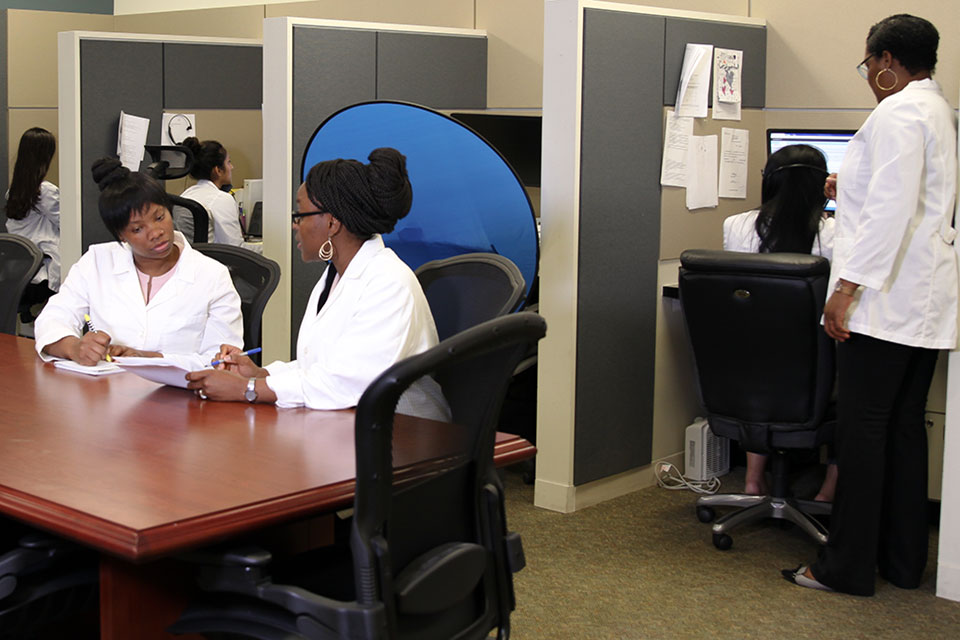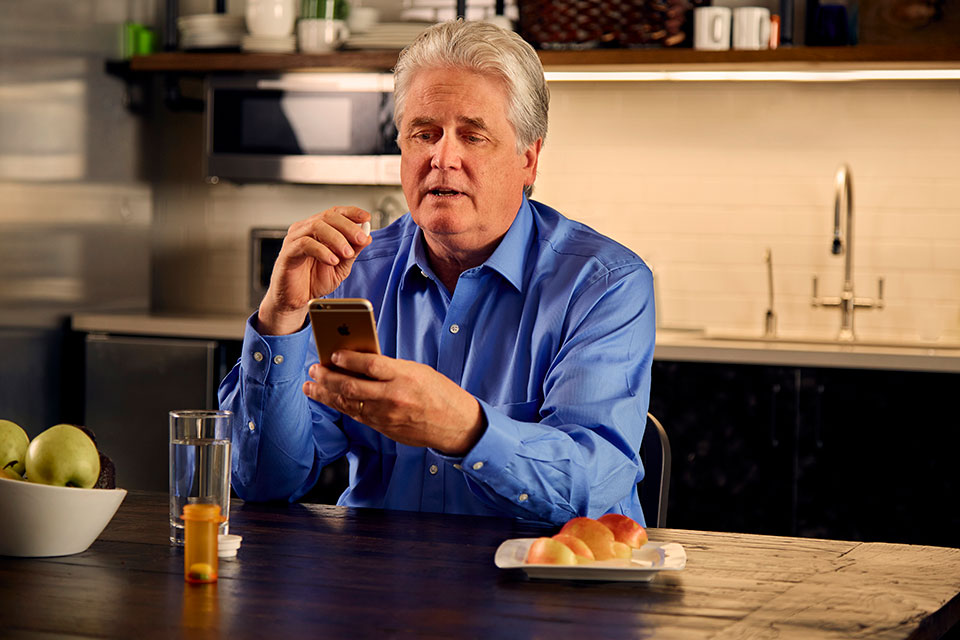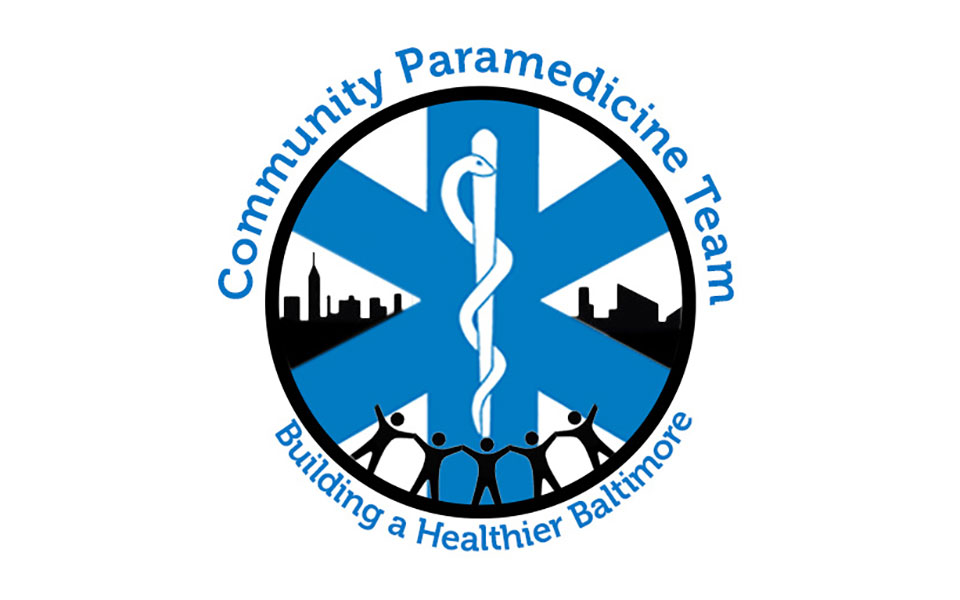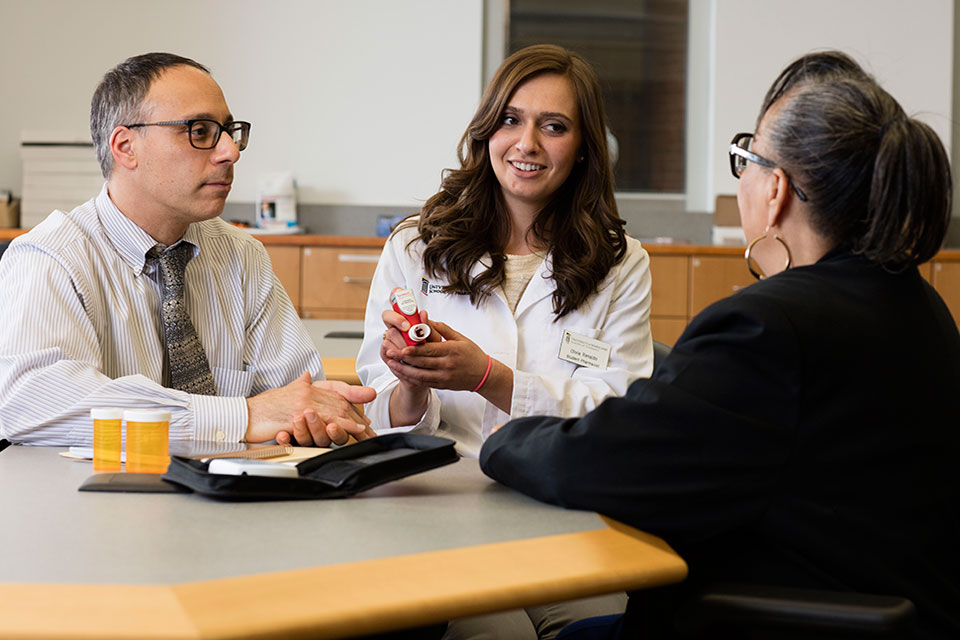SOP Joins UM Quality Care Network on Telehealth Grant
Grant from the Maryland Health Care Commission leverages cutting-edge telehealth technologies to improve health outcomes for patients with chronic obstructive pulmonary disease.

By Malissa Carroll
February 5, 2019
The University of Maryland School of Pharmacy is partnering with the University of Maryland Quality Care Network (UMQCN) on a $150,000 grant from the Maryland Health Care Commission that aims to improve health outcomes, enhance quality of primary care, and reduce costs associated with inpatient and emergency room visits for patients diagnosed with chronic obstructive pulmonary disease (COPD). Through this project, specially trained pharmacists at the School of Pharmacy in Baltimore use state-of-the-art telehealth technologies available in the School’s new Pharmacy e-Health Center to provide comprehensive medication therapy management services to patients receiving care for COPD on Maryland’s Eastern Shore.
“This grant represents an excellent opportunity for the School of Pharmacy to expand its successful partnership with UMQCN,” says Magaly Rodriguez de Bittner, PharmD, FAPhA, professor in the Department of Pharmacy Practice and Science (PPS) and associate dean for clinical services and practice transformation at the School. “We are working together to not only examine the clinical impact of using telehealth technologies to deliver medication therapy management services to patients, but also to understand the economic impact associated with offering this service to patients, particularly related to any reductions in costs associated with inpatient and emergency room visits.”
She adds, “If successful, the results could truly transform the way pharmacists’ services are integrated in the health care team, especially in primary care practices.”
COPD is a progressive lung disease that makes it difficult for people to breathe. According to the Centers for Disease Control and Prevention, it is the third leading cause of death in the United States. Recent studies have found that many patients with COPD do not adhere to their medications as prescribed, which can exacerbate symptoms associated with the illness. Although medication reviews are conducted as part of the routine care these patients receive, comprehensive medication reconciliation is often difficult to achieve due to a number of factors, such as patient literacy, frequent medication changes, hospitalization, and multiple transitions in patients’ care.
The specially trained pharmacists working on this project use evidence-based data and protocols to provide comprehensive medication management services to a variety of patient populations. They employ special videoconferencing software that is compliant with Health Insurance Portability and Accountability Act (HIPAA) regulations and allows them to work with patients and other health care providers via confidential, private, and secure videoconferences to optimize patient care in areas such as medication adherence, generic medication utilization, and patient medication reconciliation.
These pharmacists also serve as a hub to help centralize patient referrals, manage scheduling, and set patient appointments in collaboration with other health care providers.
“The use of telehealth tools represents a truly novel approach to patient care,” says Rodriguez de Bittner, who also serves as executive director of the School’s Center for Innovative Pharmacy Solutions, which houses the Pharmacy e-Health Center and oversees the School’s partnership with UMQCN. “We are able to conduct sessions led by pharmacists here at the School of Pharmacy and/or other locations, while the patient is in a completely different location, such as his or her home or physician’s office. It is a service not many pharmacies are able to offer.”
Through its partnership with UMQCN and the grant from the Maryland Health Care Commission, the specially trained pharmacists at the School are leveraging the telehealth capabilities of the Pharmacy e-Health Center to provide 100 patients who have been diagnosed with COPD and are currently receiving care from a primary care physician on the Eastern Shore with comprehensive medication therapy management services. These services are delivered via videoconference from Baltimore, and are designed to help improve medication adherence among patients and educate them about how to self-manage their illness, such as demonstrating how to correctly use an inhaler. Pharmacists also work with patients’ primary care providers to optimize and manage their medication regimens.
The ultimate goal is to develop a user-friendly telehealth model scalable to all Maryland health care practices that promotes medication safety and care coordination with an emphasis on the affordability, accessibility, and adaptability of the technology to the rural setting.
“The model that we are developing is truly unique – we are integrating pharmacists into primary care practice, but without needing a pharmacist to be physically present in the community setting,” says Rodriguez de Bittner. “We are demonstrating that the addition of these pharmacists to that practice brings value to the physicians, to the practice, and to the patient. It is opening the door for other practices to say, ‘We want to do this, too.’ And, that will create more opportunities for us to partner with additional providers and help other patients with chronic illnesses achieve optimal health outcomes.”



